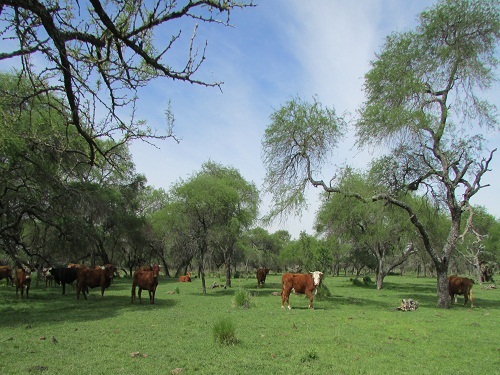
OSARA collaborators Ignacio Rojido and Sonia Canavelli, based at the Parana Experimental Agricultural Station of the Argentine National Agricultural Technology Institute, were awarded a second grant from the Ruffort Grants for Nature, which will be administered by OSARA. This award will allow the study of social and ecological dimensions of the highly endangered Espinal forested biome, where some ranchers continue to integrate livestock into native forests, rather than succumbing to pressures to deforest their land and plant soybeans.
The projects seeks to explore the relationships these stakeholders have with this endangered ecosystem and its ecosystem service, relationships which depend on both social (e.g., age, profession, social group) and ecological factors (e.g., species assemblage, ecosystem condition). The concept of nature’s contributions to people (NCP) is being used a novel proposal attempting to supersede the traditional emphasis on the ecological and economic values of ecosystem services, precisely by incorporating these more plural values.
In Argentina’s Entre Rios Province, the native forests are highly endangered, and the perspectives and stewardship practices of ranchers are crucial to incorporate, given their influence on the uses and management of these forests, which in turn are integral in their own well-being. At the same time, ranchers are a heterogeneous group of people, and it is important to consider such factors as how their perspectives change based on the size of their property, their place of residence, their activities, among others characteristics. Therefore, specific relationships with the native forest and the ways individual ranchers manage it should be different, specifically concerning expectations of conservation and its links to their livelihoods.
This Rufford grant will be used specifically to explore in depth how ranchers conceive their relationship to forests to understand this social dimension of a highly endangered ecosystem, which is under deforestation and degradation pressure as soybean production expands in north-central Argentina.
Project activities:
- Social research: During 2019, the project will conduct quantitative surveys, using the results of qualitative, in-depth interviews conducted during the 1st Rufford award. These preliminary data are being used to elaborate a series of questions that permit quantifying, rather than merely describing, the relationships of stakeholders with nature and how they perceive it to benefit them.
- Outreach material: Dissemination material (e.g., posters, brochures) will synthesize the most relevant aspects of the research. This aspect is fundamental for the scientific information that is generated to reach different social actors, and not only the academic or governmental spheres.
- Meeting with agro-technical schools: Meetings will be held in agro-technical schools to evaluate the effects of the educational module on native forest developed during the 1st Rufford project.
- Expected outcomes: The project will contribute to the use and conservation of forests in Entre Rios (e.g., to the application of provincial and national native forest laws) and the development of criteria for the National Forest Management Plan with Integrated Livestock (PNMBGI).
Read more about Ignacio’s previous Rufford project https://www.rufford.org/projects/ignacio_rojido.






